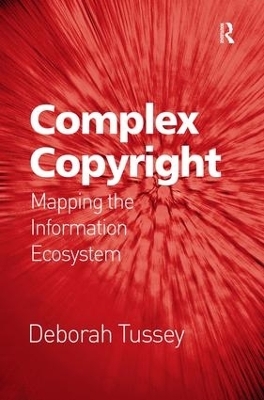
Complex Copyright
Mapping the Information Ecosystem
Seiten
2011
Routledge (Verlag)
978-0-7546-7784-0 (ISBN)
Routledge (Verlag)
978-0-7546-7784-0 (ISBN)
Argues that copyrighted works are the products of complex creative systems and, consequently, designers of copyright regimes for the global 'information ecosystem' should look to complexity theory for guidance. This study shows how copyright law must tolerate certain chaotic elements that may be essential to the sustainability of complex systems.
This book draws on a wide selection of interdisciplinary literature discussing complex adaptive systems - including scholarship from economics, political science, evolutionary biology, cognitive science, and religion - to apply general complexity tenets to the institutions, conceptual framework, and theoretical justifications of the copyright system, both in the United States and internationally. The author argues that copyrighted works are the products of complex creative systems and, consequently, designers of copyright regimes for the global 'information ecosystem' should look to complexity theory for guidance. Urging legal scholars to undertake empirical studies of real-world copyright systems, Tussey reveals how the selection of workable configurations for the copyright regime is larger than that encompassed by the traditional, entirely theoretical, debate between private property rights and the commons. Finally, this unique study articulates how copyright law must tolerate certain chaotic elements that may be essential to the sustainability of complex systems.
This book draws on a wide selection of interdisciplinary literature discussing complex adaptive systems - including scholarship from economics, political science, evolutionary biology, cognitive science, and religion - to apply general complexity tenets to the institutions, conceptual framework, and theoretical justifications of the copyright system, both in the United States and internationally. The author argues that copyrighted works are the products of complex creative systems and, consequently, designers of copyright regimes for the global 'information ecosystem' should look to complexity theory for guidance. Urging legal scholars to undertake empirical studies of real-world copyright systems, Tussey reveals how the selection of workable configurations for the copyright regime is larger than that encompassed by the traditional, entirely theoretical, debate between private property rights and the commons. Finally, this unique study articulates how copyright law must tolerate certain chaotic elements that may be essential to the sustainability of complex systems.
Deborah Tussey is a Professor at the Oklahoma City University School of Law, where her areas of specialty include international intellectual property law, copyright law, and computer law.
Introduction; Chapter 1 Are Publishers Really Like Prairies? Copyright Systems as Complex Adaptive Systems; Chapter 2 A Philosopher and a Lobbyist Walk into a Bar: The Theory and Reality of Copyright Lawmaking; Chapter 3 Systems Analysis for the Copyright Ecosystem; Chapter 4 Chaos, Creativity, and Copyright; Chapter 5 Complexifying Copyright Law: A Possible Future for Copyright Lawmaking;
| Verlagsort | London |
|---|---|
| Sprache | englisch |
| Maße | 156 x 234 mm |
| Gewicht | 430 g |
| Themenwelt | Kunst / Musik / Theater ► Design / Innenarchitektur / Mode |
| Schulbuch / Wörterbuch ► Lexikon / Chroniken | |
| Recht / Steuern ► EU / Internationales Recht | |
| Recht / Steuern ► Wirtschaftsrecht ► Gesellschaftsrecht | |
| Recht / Steuern ► Wirtschaftsrecht ► Urheberrecht | |
| Sozialwissenschaften ► Kommunikation / Medien ► Buchhandel / Bibliothekswesen | |
| Wirtschaft ► Betriebswirtschaft / Management | |
| Wirtschaft ► Volkswirtschaftslehre | |
| ISBN-10 | 0-7546-7784-2 / 0754677842 |
| ISBN-13 | 978-0-7546-7784-0 / 9780754677840 |
| Zustand | Neuware |
| Haben Sie eine Frage zum Produkt? |
Mehr entdecken
aus dem Bereich
aus dem Bereich
Kommentar
Buch | Hardcover (2024)
C.H.Beck (Verlag)
CHF 306,55


